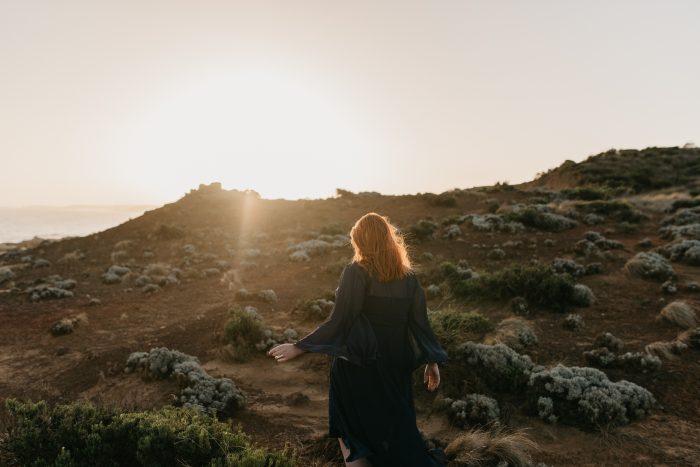I was well into my 20s before I discovered I was a highly sensitive person.
Scrolling through Facebook, I found one of those listicles and reading it was like a lightning bomb.
Easily overwhelmed? Tick.
Hates violent media? Tick.
Deeply moved by the arts? Tick tick.
Feels other people’s emotions? Tick tick tick.
All my life I’d felt different, raw, misunderstood, and isolated. Growing up, I was called “melodramatic,” “overreactive,” and told I needed to stop “flying off the handle.” My emotions are a rollercoaster, even as an adult, and I suffered from anxiety, panic attacks, and depression.
People never seemed to understand the depth of my emotions and experience. It’s a strange form of gaslighting when people tell you “it can’t be that bad” when you literally feel like you’re walking around with not enough skin.
But it wasn’t just the lows. The highs were equally as potent. Music gave me goosebumps and all of the feels. I would get lost in long books and wild poetry. I once openly wept at the beauty of a contemporary dance piece.
Life rarely felt easy, and I longed to be “normal.” But reading this article about highly sensitive people was like finally discovering home.
Here was a label that encompassed everything I thought was wrong with me. Plus this article said being highly sensitive was totally normal!
The scientific term for the highly sensitive trait is sensory processing sensitivity. It means highly sensitive people are much more likely to process internal and external stimuli more deeply than average. And there are lots of gifts that go along with it, like deep empathy, noticing exquisite details that other people miss, and being intuitive and highly creative.
We are the dreamers, healers, and artists—but we’re also much more likely to experience HSP overwhelm in a chaotic world.
Over the next two decades, my awareness of how deeply sensitive I really was grew. I embraced my gifts of deep empathy and it fuelled my creativity and music. I learned to love and accept my highly sensitive self, instead of pushing myself to be like the people around me, which meant that I had better boundaries and healthier relationships.
I gave myself permission to say no to things that drained me, and yes to the quiet rest and rejuvenation I needed regularly.
But there was just one thing I couldn’t wrap my head around. If I was so highly sensitive, why was I also a thrill seeker?
Here’s the truth. I am wildly attracted to situations that seem to fly in the face of conventional highly sensitive traits. I love to travel off the beaten track and crave new and intense experiences.
In my teens and 20s, I regularly travelled to doofs, Australian parties in remote bushland settings with loud dance music, lasers, fire twirlers, and psychedelic art.
For hobbies, I practiced pole dancing, martial arts, and roller derby—sports famous for risk and injury. I once got caught outside in a tropical storm on a small beach in Thailand. Running through the wind and rain while the sea pounded the shore was intensely invigorating.
In my 30s, I lived in rural Finland during the arctic winter, went on a Northern Lights tour in Iceland, took up archery, and returned to my love of roller skating.
Why was I so attracted to these intense experiences when I was so clearly highly sensitive?! I didn’t understand how I could love being so far out of my comfort zone whilst simultaneously being regularly overwhelmed by stimuli.
Until I heard about the High Sensation Seeking test.
Turns out that Elaine Aron, the scientist who discovered and coined the term “highly sensitive person,” realised that these people could also be thrill seekers.
And…it’s complicated. She once described living with both traits as “like living with one foot on the accelerator, one foot on the brakes.”
This is because the area of the brain that governs the highly sensitive trait is different than the one that governs high sensation seeking. They’re independent from one another, so whilst it seems weird, both traits can coexist in the same person.
People who score high on the sensation seeking test are easily bored, avoid routine, enjoy physically thrilling sports, love to travel to foreign places, and get restless if they stay at home for too long. These are all things I identify with too.
Reading about these two different traits makes it sound like being a high sensation seeker is the opposite of being a highly sensitive person. But the more I looked into it, I discovered that’s not quite true.
Being highly sensitive isn’t about being worried, anxious, or overwhelmed. It’s about pausing and checking to see if situations are dangerous or rewarding, which means highly sensitive people are conscientious and keen observers.
High sensation seeking is about curiosity and exploration, especially to discover and gain new experiences. It’s centered around risk and reward in the hope that the reward will be pleasurable.
Neither trait is inherently good or bad. Some situations require diligence and some require exploration. Accepting that you can have both traits, and appear as a bit of an enigma to other people, is liberating.
In my life, I’ve started to see how these two traits work well together.
For example, I love to roller skate. Zooming around to loud music is so much fun for me. But I never put on my skates without also putting on safety gear, like knee pads and wrist guards. I take my time when learning new tricks and keep to indoor skating. If I was ever to venture outdoors, I know I would add a helmet to my list of safety gear, and I would go slowly, so I could pause and check to make sure the path was free from potential fall risks.
These days, I’m approaching 40 and I’m more comfortable than ever with my two “opposing” traits. I feel empowered by my empathy and know that my sensitivity is a superpower. I don’t want to hide it, switch it off, or give it away. And I allow my sensation seeking to give me new experiences that I might not get to have otherwise.
I no longer wish to be normal. It’s overrated and an illusion. Being a highly sensitive person and a high sensation seeker is weird—and I wouldn’t have it any other way.
Us highly sensitive and high sensation seekers are diamonds, rare and vibrant. Let’s embrace these aspects of our personality and give ourselves permission to shine. The world becomes a far more interesting place when we do. Plus, it’s much easier than trying to suppress our true nature.
Cheers to you, my fellow HSP/HSS weirdos.
~












Read 0 comments and reply